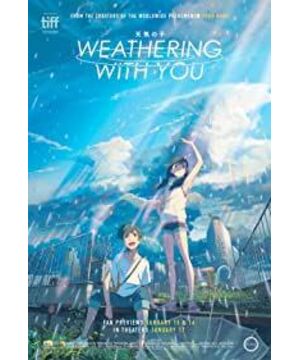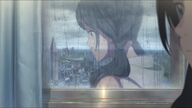At the beginning of the film, the 16-year-old protagonist Fan Gao ran away from home alone, his face covered with bandages and lonely went to the ship heading for Tokyo. Among the Catchers in the Rye, the protagonist Holden was expelled from school at the age of sixteen. When Holden escaped from Pansy’s school, he was beaten by his roommate Stella Red and walked to the train station with a face full of trauma. We return to the beginning of the story of the son of the weather, Fan Gao stared at the heavy rain in the city of Tokyo, everyone else went to shelter from the rain, but the protagonist did not hide from the rain on the deck at all, quite a bit of a misty rain in his life. In fact, this is a tribute to the catcher in the wheat field. "Hey, it's starting to rain heavily. It's a downpour, I can swear to the sky. All parents, mothers, and others, all rushed to hide under the eaves of the turntable, lest I get wet from the rain, but I Still sitting on the bench for a while, I was soaked...but I didn’t care. Suddenly I became so fucking happy, seeing old Phoebe go round and round. Stop. I almost yelled fucking, I was so happy in my heart, I honestly tell you. I don’t know why. She wears such a blue coat, keeps spinning like that, it looks true It’s so damn good. God, I really hope you were there." We all know that filmmakers are good at symbolism, and Makoto Shinkai is naturally the same. Some people will say that he is using the city of Tokyo as a metaphor for the catcher in the wheat field. The younger sister in the middle, symbolizes the hero’s hope and salvation. In fact, Xin Haicheng uses flashbacks. From the beginning, Xin Haicheng pays tribute to the catcher in the wheat field. He will find his "Phoebe" in the city of Tokyo. Tokyo is not a hope. It is just a carrier for the protagonist to find 100% redemption and hope for the girl. In Xin Haicheng’s previous works, the girls who fell in love with the protagonist are often older than the male protagonist. Xin Haicheng was also ridiculed by the Azhai as being controlled by the year. In the Son of the Weather, Haruhime symbolizes 100% beauty. In Salinger’s works Young girls are often used to express the image of innocence, harmony and beauty, so Makoto Shinkai compromised this time and used huge fragments to depict the plots of many other children.
In contrast, Tokyo is more similar to the existence of "New York" in the wheat field. And in the story, the male main sailor Gao has repeatedly complained about Tokyo, and he suffered violence and coldness in a street in Kabukicho and various custom shops in Tokyo. It reflects Holden's experience in various bars, hotels and nightclubs among the catchers in the wheat field. The hypocrisy and cruelty of the adult world. Among the Catchers in the Rye, Holden was severely beaten by Morris, a pimp lifter, and knocked down on the floor. There is such a description. "I imagined myself coming out of the fucking toilet, neatly dressed, with an automatic pistol in my pocket, a bit staggered... "So in the same situation, Xin Haicheng really fired a pistol to the male main sail, to express Xin Haicheng's sincere respect to Mr. Salinger. At the same time, it is not to be ignored that Fan Gao met on the boat bound for Tokyo. The core character of the work-Keisuke Suka. In the story, Keisuke Suka's niece Natsumi has repeatedly said that Hodaka and Keisuke Suka are very similar. They are the kind of kittens who can't bear to subconsciously want to go when they see a lost kitten. Save him. This is obviously a famous line in tribute to the catcher in the wheat field. "There is a group of children playing games in a large wheat field. There are tens of thousands of children, and there is no one nearby—no adult, I mean—except me. As for me, it's on the cliff of that bastard. My job is to keep watch there. If a child runs to the edge of the cliff, I will catch him—I mean the children are running wildly, and I don’t know where they are going. I have to come out from somewhere and catch them. I do this all day long. I just want to be a catcher in the wheat field. In Shinkai Makoto's movie, Hougao is a lost kitten, a kid aimlessly about to fall off a cliff, and Keisuke Suka is a catcher in a wheat field. There is ample clue about this. —It is the red hunter hat given by Keisuke Suka to Hogao. The watchman in the red hunter hat in the wheat field is a key symbol that runs through from the beginning. It is a silent provocation and indignation, expressing the strong dissatisfaction and dissatisfaction with the society in the heart. Rebellious consciousness. Wearing a red hunter hat can not only pretend to protect yourself against external pressure, but also have a strong desire to resist reality and get rid of the hypocritical society of adults. In the Child of Weather, the moment Fan Gao puts on the red hunter hat is a symbol of His road of rebellion is about to begin. Moreover, red is a symbol of burning and passion, revolution and bloodshed in Western culture. In Stendhal’s masterpiece "Red and Black", red symbolizes the fires of previous French revolutions. And new ideas that can bring unlimited vitality , As well as Julian’s fiery heart and his vigorous energy like a fire, it is opposite to the ugly "black" of French society, full of radicalism and rebellion. At the same time, red also symbolizes love. Returning to the Catcher in the Rye, this book mainly tells the story of Holden from the world escape to the rebel and finally to the Catcher, while Xin Haicheng is different. He makes Fan Gao a complete rebel. The images of the watchman and the core character Antorini teacher in the Rye Field have been added to the figure of Keisuke Suga. Over time, the image of Keisuke Suga as a rebel no longer exists, but he saw himself from Hodaka that year, so he would cry at the police officer, and the reason why Hodaka pointed a gun at Suga was a rebel. With the inner choice between the two personalities of the watchman, Xin Haicheng embodies the two personalities of the same person into two characters more deeply embodies this contradiction. In the end, the rebel defeated the inner watchman. The watchman compromised and rebelled. The winner also won. We must know that among the Catcher in the Rye, the ending of the story, Holden, was eventually sent to a mental hospital for psychoanalysis, while Cheng Ge's fictional Fan Gao was not sent to the mental hospital by the police. Instead, he successfully subverted the adult’s world and became a veritable rebel. From this point of view, Xin Haicheng may continue to write the last chapter of The Catcher in the Rye, just like John Lennon fans did. "For a person, they are destined to look for something that their surroundings cannot provide from time to time throughout their lives, or they think that their surroundings cannot provide it, so they give up searching, and they give up even before they really start searching. The sign of an immature person is that he is willing to die vigorously for a certain reason, and the sign of a mature person is that he is willing to live humbly for a certain reason." These few passages are in the wheat field. Although not directly mentioned in the movie by Xin Haicheng, the main theme of the watchman of the movie is illustrated by the way of reflection and the unique language of the film at the end. Here, silence is better than sound. We should be Xin Haicheng’s greatness. And applaud. ps There is one more thing I forgot. The Japanese version of the Catcher in the Rye field read by Fangao should have been translated by Haruki Murakami, and Hundred Percent Haruna is obviously paying tribute to Murakami's "Meeting a 100% Girl", and it should also be Makoto Shinkai. A love letter to Haruki Murakami. Compare "The End of the World and Cold Wonderland" to see if this is also Cheng Ge's best world system. Victory. We must know that among the Catcher in the Rye, the ending of the story, Holden, was eventually sent to a mental hospital for psychoanalysis, while Cheng Ge's fictional Fan Gao was not sent to the mental hospital by the police. Instead, he successfully subverted the adult’s world and became a veritable rebel. From this point of view, Xin Haicheng may continue to write the last chapter of The Catcher in the Rye, just like John Lennon fans did. "For a person, they are destined to look for something that their surroundings cannot provide from time to time throughout their lives, or they think that their surroundings cannot provide it, so they give up searching, and they give up even before they really start searching. The sign of an immature person is that he is willing to die vigorously for a certain reason, and the sign of a mature person is that he is willing to live humbly for a certain reason." These few passages are in the wheat field. Although not directly mentioned in the movie by Xin Haicheng, the main theme of the watchman of the movie is illustrated by the way of reflection and the unique language of the film at the end. Here, silence is better than sound. We should be Xin Haicheng’s greatness. And applaud. ps There is one more thing I forgot. The Japanese version of the Catcher in the Rye field read by Fangao should have been translated by Haruki Murakami, and Hundred Percent Haruna is obviously paying tribute to Murakami's "Meeting a 100% Girl", and it should also be Makoto Shinkai. A love letter to Haruki Murakami. Compare "The End of the World and Cold Wonderland" to see if this is also Cheng Ge's best world system. Victory. We must know that among the Catcher in the Rye, the ending of the story, Holden, was eventually sent to a mental hospital for psychoanalysis, while Cheng Ge's fictional Fan Gao was not sent to the mental hospital by the police. Instead, he successfully subverted the adult’s world and became a veritable rebel. From this point of view, Xin Haicheng may continue to write the last chapter of The Catcher in the Rye, just like John Lennon fans did. "For a person, they are destined to look for something that their surroundings cannot provide from time to time throughout their lives, or they think that their surroundings cannot provide it, so they give up searching, and they give up even before they really start searching. The sign of an immature person is that he is willing to die vigorously for a certain reason, and the sign of a mature person is that he is willing to live humbly for a certain reason." These few passages are in the wheat field. Although not directly mentioned in the movie by Xin Haicheng, the main theme of the watchman of the movie is illustrated by the way of reflection and the unique language of the film at the end. Here, silence is better than sound. We should be Xin Haicheng’s greatness. And applaud. ps There is one more thing I forgot. The Japanese version of the Catcher in the Rye field read by Fangao should have been translated by Haruki Murakami, and Hundred Percent Haruna is obviously paying tribute to Murakami's "Meeting a 100% Girl", and it should also be Makoto Shinkai. A love letter to Haruki Murakami. Compare "The End of the World and Cold Wonderland" to see if this is also Cheng Ge's best world system.
View more about Weathering with You reviews











